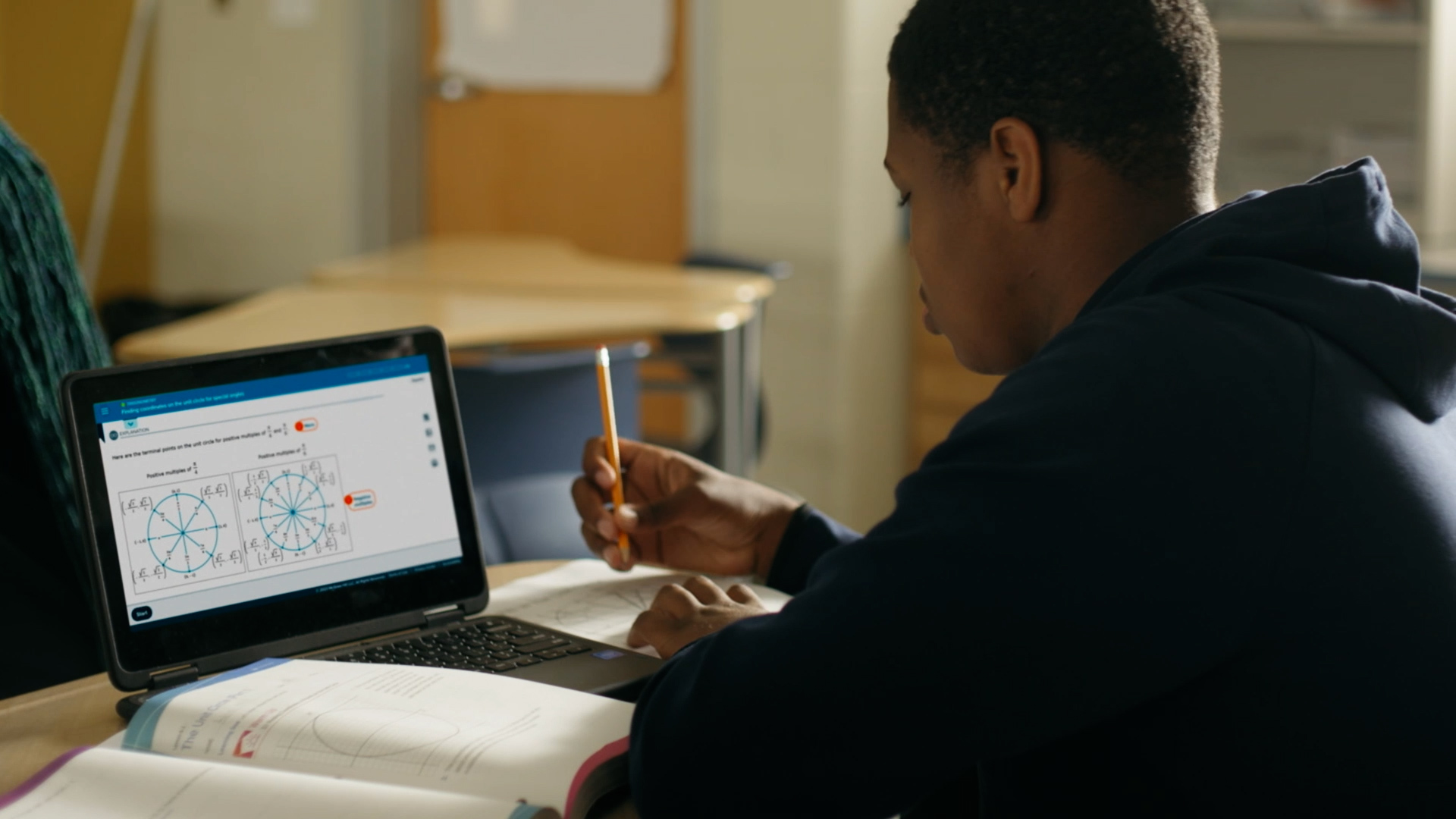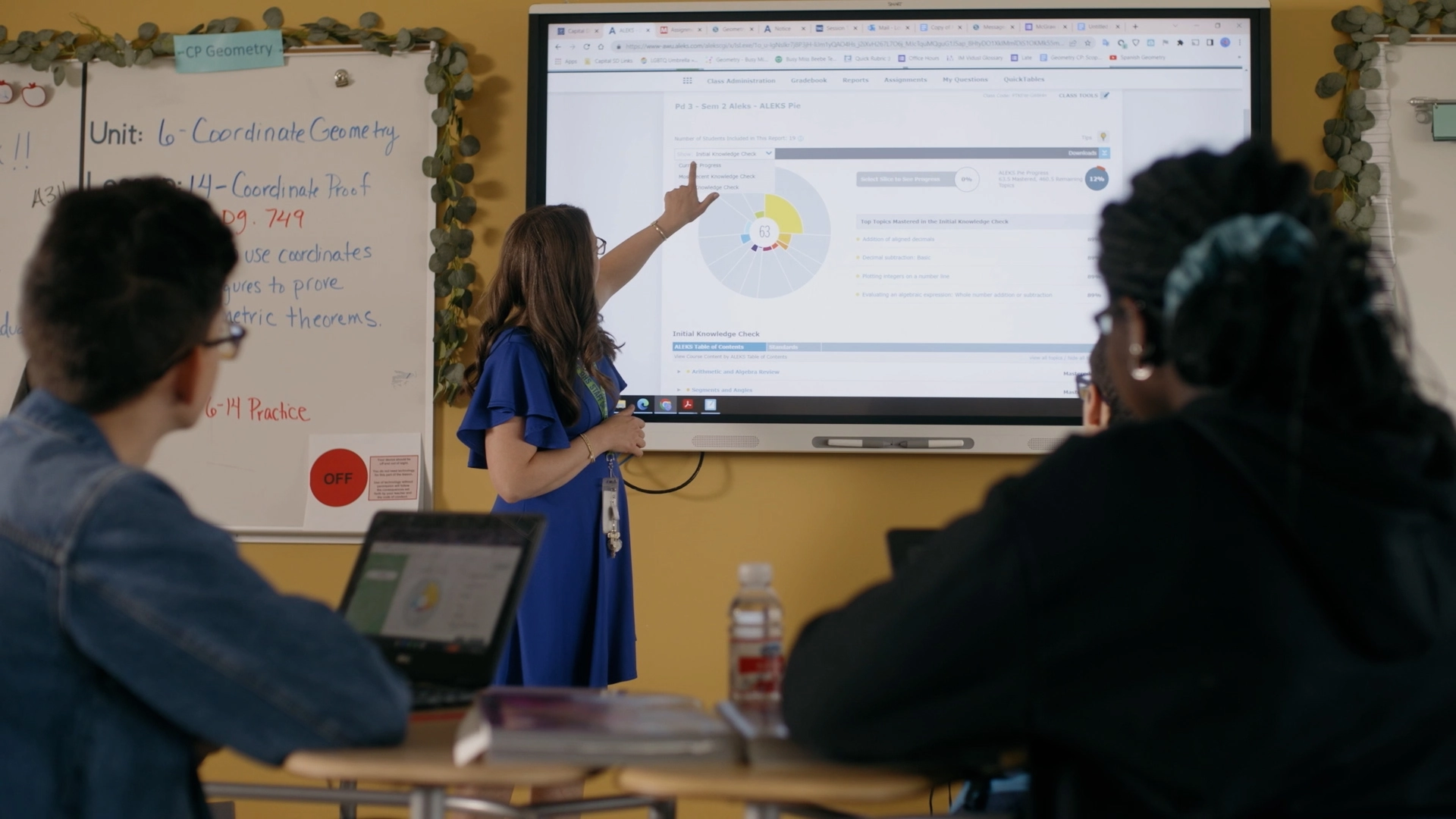My Account Details
‘My students aren’t afraid of math’: Dover High uses data to unlock math momentum
How Dover High School is using ALEKS to fill learning gaps in math and help students succeed.
Algebra scares me. I’m terrible with numbers. I hate math.
You may have heard a student say something like this – or maybe you’ve even thought it yourself. It’s no secret that math gets a bad rap. It’s routinely ranked as the least-favorite subject in school, and it’s the reason for countless homework struggles.
Yet at Dover High School in Dover, Delaware, math has a different reputation. It’s visual, collaborative and, yes, at times even fun. There are many reasons for this: Teachers encourage students to be resilient and keep working until they arrive at the solution. Gaps in knowledge are reframed as just another mile marker on students’ learning journey.
The lifeblood of this transformation is technology. It’s making abstract concepts come alive. It’s revealing brand-new ways for educators to support students. And it’s proving to learners that they may just be a math person after all.
Helping to fill in the learning gaps
Every year, math classes at Dover High begin the same way: Students take an initial knowledge check through McGraw Hill ALEKS, an AI-powered platform that uses data to identify learning gaps and provides personalized support to learners.
The results of the assessment don’t cause panic or dismay. Instead, they’re seen for what they are: an objective, holistic view of each student’s skillset. And that information helps educators identify where extra support might be needed.
“If I see a gap or a particular weakness, I know I can substitute in an extra lesson or try to do a refresh of those skills,” explains Christina Lockerd, who teaches geometry at the school. “Or I may build a resource that’s going to help them get motivated about the lesson but also feel successful.”
ALEKS is also used throughout the year to supplement course material and to help address pandemic-related learning loss. For instance, if ALEKS data reveals a student needs to boost certain skills before the class starts a new lesson, ALEKS will assign them prerequisite practice problems to ensure they are ready for the next lesson. “It doesn’t take away from our actual lesson time, and we can still continue on the same pacing guide,” Lockerd explains.
Typically, learners spend a dedicated amount of time in class working on their customized paths. Though the work is individual, the students are seated in a group. The close quarters allow them to help each other out when needed, which Lockerd says she loves to see.
Algebra 2 teacher Tyrone Smith is also a big fan of collaboration. In fact, he starts each year with a few goals in mind: “I'm going to teach you to see. I'm going to teach you to work with each other. I'm going to teach you to teach yourself,” he says.
The data from ALEKS, he explains, shows him individual skill sets, which helps inform in-class groupings. “I don’t always pair the strongest with the weakest,” Smith says. “Sometimes I’ll sit two who are struggling, but they may be struggling in different areas. The hardest part is encouraging them and giving them the confidence to explore on their own.”

Lighting the spark of math momentum
A surprising thing happens every year when students see the results of their initial knowledge check from ALEKS. The color-coded pie chart reveals what skills they bring to the table — and they’re usually far more than the learner realized. “Some students feel like, ‘I don’t know math, I’m not good at math,’” Lockerd says. “Here’s a tool that tells them, Look, you’re great at ratios. You’re great at scale factors. It really quantifies that for them, and it individualizes it.”
“Students realize that maybe they have more skills than they thought they had, which can be very empowering. It changes the mindset, and the mindset is everything. We need a student to feel engaged and motivated when they come in here, because that’s the bare minimum they have to put their best foot forward.”
In fact, confidence can go a long way when it comes to gaining math momentum. It allows learners to work independently and in groups, and it helps them tackle new challenges. One of Smith’s students, for example, had been struggling with a particularly thorny concept for several weeks. Then, one afternoon, the lightbulb went on. Overjoyed, the student ran to tell Smith, who promptly started dancing. (“I do that when I get excited,” he says.)

This kind of tenacity is exactly the kind of lifelong skill Lockerd and Smith want to impart. After all, their students will be in the workforce in a few short years, and no matter what field they go into, math will play an integral role. Feeling comfortable reading and interpreting data is crucial, and the insights from ALEKS provide good practice. “My students aren’t afraid of math,” he says.
Smith in particular likes to tie his lessons back to real-world scenarios. One example he brings up is the job interview. “Most places will ask you if you have any questions you’d like to ask us,” he says. “And I tell my students to let your boss know that if he has a problem with you, if he has anything that would make you a better worker, please feel free to present it to you. It’s not bad news. You want the data so you can be better."